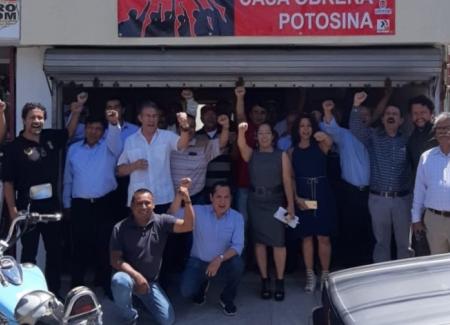Strengthening Workers’ Ability to Exercise their Labor Rights in Mexico
Print
To build the capacity of workers, support worker engagement and organizing, and strengthen democratic worker organizations in the aerospace, mining, and call center industries, such that they become protagonists in fulfilling the potential of Mexico’s historic labor reform. The project will offer workers and their organizations expert technical assistance, ongoing skills development, and pro bono advisory and legal services. Additionally, the project will create spaces for analysis, exchange, reflection, and the development of recommendations to improve labor law reform implementation.
The Problem
After Mexico enacted its sweeping labor justice reform on May 1, 2019, significant obstacles impede successful implementation. While the basic administrative and fiscal demands are daunting, reform is further complicated by profound worker mistrust of the industrial relations system and its most powerful actors. There are limited alternatives to protection unions, minimal public awareness of the new rights and responsibilities of labor actors under the reform, and there is an extreme imbalance of power between dominant protection unions and the weaker upstart democratic labor movement. Mexico’s independent labor movement largely lacks the reach and clout to create a counter-narrative on worker rights, so workers that are not involved in or adjacent to active organizing campaigns are largely unaware of the changes. Although some independent unions with experience, political capital, legal support, and other resources are organizing new democratic unions and successfully negotiating authentic collective bargaining agreements in a few sectors, the independent labor movement overall needs greater capacity and support to fully take advantage of the opportunities that the reform has created.
Our Strategy
The project approach holds that any intervention to expand workers’ labor law knowledge must build worker capacity to understand the applicability of relevant labor laws to their circumstances and conduct their own assessments of workplace violations. It also must ensure that this capacity is shared across a broad, evolving workforce, and sustained over time. Working with unions, which are democratically-controlled and based in workplaces, provides a structural way to embed this capacity in sustainable, local civil society organizations that enable workers to directly advocate to government and employers for improved labor law enforcement. The project interventions will complement recent government advances in labor law enforcement by providing training to help workers and their organizations more effectively document violations, make strategic use of reporting and enforcement mechanisms, and seek the most appropriate remedy, depending on the specifics of the case and sector.
Learn About Our Success

For worker voice to truly be heard and to make collective bargaining more effective in order to increase wages, obtain equal treatment, and improve working conditions, workers and worker organizations need to be able to freely meet and exchange ideas.
- Grantee:
- Solidarity Center
- Contact Information:
- (202) 693-4900 / Office of Trade and Labor Affairs (OTLA)
- Tags:
- Trade
- Awareness Raising
- Capacity Building
- Civil Society
- Data Collection
- Mexico Labor Law Reform
- Research
- Unions
- USMCA Technical Assistance
